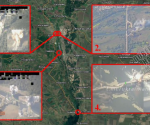MOAB: mother of all betrayals
In Trump’s latest militaristic spasm, the nearest thing to a nuclear bomb that the US military possesses in its arsenal, a Massive Ordnance Air Blast bomb, or the MOAB, costing a casual 16 million dollars apiece, was dropped on Afghanistan. When the ground stopped shaking, and when the local folks’ were able to hear again (the Afghan government said that civilians weren’t affected – naturally), it was discovered that 36 militants had been killed. Could this, then, make ISIS-K, or ISIS in “Khorasan”, the most expensive terrorists to kill ever, with each one “worth” nearly $450,000? This disproportionate blood/treasure equation was also spotted at the Guardian and declared to be “baffling”. Trying to be fair, though, the target of the bomb had been stated as being an underground complex of tunnels used as a military operations base – (funded for the Mujahedeen by the CIA, as it turns out). But does the reader see the flaw, and did he or she see it as quickly as the author did?
If these tunnels were only sheltering 36 fighters, they actually can’t as much a significant tactical target as the US military’s public relations made out. Indeed, the Nangarhar Offensive of 2016 reportedly all but cleared ISIS out of the province in which these tunnels are located – except for one district, which the group is apparently confined to. Delving deeper into the history of ISIS-K, or ISPK (Islamic State in Khorasan Province), it appears that they were originally well armed Pashtun “refugees” from Pakistan who the Afghan government welcomed “hoping to use them against Pakistan”, and to act as a bulwark against the Taleban. It looks for all the world as if these foreigners became political masters over the resident population without the Afghan government raising an eyebrow, or a finger to a trigger – this kind of invasion where the ruler of a country lets aliens reign over a portion of his territory is all very Biblical, and very odd for someone used to Western national boundaries. It certainly shows that the Afghan government can’t hold much sway in Nangarhar province – and bear this in mind. As it happens, there was a pro-Taleban popular uprising, followed by a decisive ISIS-K counter offensive – and then the Afghan national armed forces got involved, i.e. the operations abovementioned. It might be worth knowing when considering this history that the Taleban proved consistent in its famous dedication to eradicating poppy cultivation and drug sales while holding power in Nangarhar.
The US bomb strike is very much the stroke of a combatant who doesn’t have the manpower to repress an enemy on the ground – and thus could be said to be an indicator of weakness. That being said, the ISIS-K appeared to have already been contained. There are two options, then, to choose from in terms of understanding the meaning of this strike. Firstly, it was an effort to destroy amenities that facilitate military control of the region – but then, from whom would the US be trying to deny this, the Taleban, the traditional poppy-crop burning power, or ISIS? Secondly, the strike could be empty of military significance, and for purely psychological purposes. After all, how does a public, without any access to the target, and having no other than the US or Afghan military’s say-so to go on, know that the bomb destroyed any underground labyrinth? Indeed, not very long after the strike, in some quarters of the corporate-media – as if sensing a need to be apologetic and excuse-making – the bombing started to get called a message to North Korea. If this is the case – if the bombing was indeed a message – then the author doesn’t think it was one directed at North Korea, but instead one intended for Trump’s domestic audience; a message felt needed after last week’s cruise missile debacle on Syria that went so badly wrong and came nowhere near accomplishing what the US government had high, and delusional, hopes for it to attain (that topic is the subject matter of an article to follow this one).
To put it all very succinctly, Trump appears to be reneging on promises of domestic policy that got him into office*, and big bombs, even dropped into wide open and empty regions of the Afghan mountains and the tundra wilderness of deepest central Asia , seem to have a power over a particular kind of American who would have voted for Trump, and who think (undoubtedly helped to that understanding by alternative-media whose disgrace is double because it promoted Trump on what are turning out to be lies) that dropping a bomb is exactly the right sort of thing an American President should do, so that in the minds of these people, the betrayal is worth putting up with, and the damage dealt by Trump a sacrifice worth making. If the reader has any doubts, regard the following text from a tweet that the author somewhat casually found by searching for the term “MOAB”; it’s bound not to be an isolated incident:
36 ISIS savages were killed. And zero civilians. #MOAB #MAGA
*There’s not much coverage of Trump’s backsliding in corporate-media, but look at this tweet by David Knight – a one-time Trump supporter, and a high profile one, who condemns the dangerous cultic, no questions asked support illustrated in the tweet text at the foot of the body of this article, and who – much to his credit – is going against the grain of his Infowars employer. He identifies three areas in which Trump’s betrayal has shown itself – the modified stance on China, thus globalism, is the one less obvious. Moreover, he actually calls out Trump’s militarism as a strategy of distraction.
Art of Deal: China can continue to screw America if Trump can bomb NK to distract voters from his failed #Obamacare repeal & tax reform Yeah
Update 15/04/2017:
Afghan officials are now saying many more ISIS fighters were killed by the MOAB. A spokesman for the Nangarhar provincial governor said: “We pulled out 90 dead bodies of fighters who lived underground in those tunnels and caves for years, operating and planning attack across the country.” If the information presented in this FBEL article is true – to wit, ISIS-K were considered confined to one district in Nangarhar – then this governorial spokesman is lying. This increase in the number of casualties should perhaps be considered a sign of sensitivity to the criticism and analysis that the bomb strike has elicited.


















